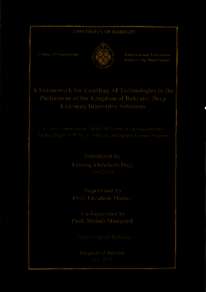Identifier
https://digitalrepository.uob.edu.bh/id/bf586fec-064d-4303-9244-3912af6a955b
A Framework for Enabling AI Technologies in the Parliament of the Kingdom of Bahrain: Deep Learning Innovative Solutions
Linked Agent
Mattar, Ebrahim, Thesis advisor
Mangoud, mohab, Thesis advisor
Date Issued
2023
Language
English
Extent
[3], 163 pages.
Institution
University of Bahrain, College of Engineering
English Abstract
Abstract :
The integration of artificial intelligence (AI) technologies has the potential to transform many aspects of parliamentary procedures, from streamlining administrative tasks to enhancing decision-making processes. In this context, this thesis proposes a framework for enabling AI technologies in the parliament of the Kingdom of Bahrain, focusing on computer vision techniques based on Deep Learning (DL). The proposed framework consists of three primary solutions that address the challenges of face detection, face recognition, and facial expression recognition. The main contribution is to enhance face detection by proposing a new model based on a modified YOLOv7 architecture integrated with Convolutional Block Attention Mechanism (CBAM) and Deep Learning-based SORT (DeepSORT) for object tracking. The model's network architecture is modified to include a new head for tiny face detection, which has shown better accuracy in experiments conducted on the WIDERFACE hard classes. The proposed solution enables the detection of faces indoors, converting them into 2D coordinates and then visualizing them on a 2D map to track the attendance and sitting of parliament members. For face recognition, the proposed model is integrated with FaceNet and trained on a custom dataset to recognize the detected faces with robust results and speed. Finally, the facial expression recognition model is based on a modified YOLOv7 architecture and a CNN classifier trained on the FER2013 dataset after preprocessing and cleaning them. The experiments showed that the proposed model improved the detection accuracy for tiny faces compared to other models. The experiments show that the proposed model outperforms the other object detection models regarding a recall, F1-score, and both mAP scores while maintaining a high precision score. In particular, the proposed model shows the most remarkable improvement in recall (26.76%) compared to the best-performing baseline (YOLOv7-face), indicating that it is better at detecting actual positive instances in the dataset. The percentage improvements in precision, Fl-score, and [email protected] are 1.81%, 8.45%, and
Note
Title:
ناء إطار عمل لتمكين تقنيات الذكاء الاصطناعي في مجلس النواب بمملكة البحرين: حلول مبتكرة باستخدام التعلم العميق
ناء إطار عمل لتمكين تقنيات الذكاء الاصطناعي في مجلس النواب بمملكة البحرين: حلول مبتكرة باستخدام التعلم العميق
Member of
Category
Theses

